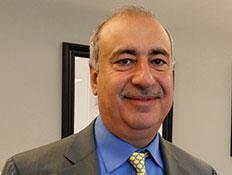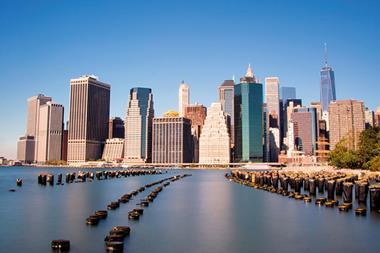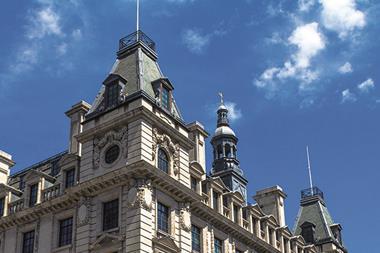Back in 2014, I wrote an article here that posed the question: “Why is London the destination of choice for Middle Eastern investors?”

A great deal has changed during that time, both in London and the Middle East, and now seems an opportune time to revisit the question.
For many years, investors have seen the UK as a secure and mature real estate market in which the barriers to entry are not burdensome. This attraction remains, and we continue to see overseas money keen to invest. But is so much of it coming from the Middle East?
Historically, we have seen a great deal of investment from the region, stemming from the vast wealth pots established in various sovereign wealth funds. We are all aware of the large transactions completed by the likes of Qatari Diar, Qatar Investment Authority, Kuwait Investment Authority and Abu Dhabi Investment Authority.
These investments were effectively funded by the huge surplus cash piles accumulated principally from the sale of oil and gas. The focus of these funds was to ensure sensible market returns on a risk-reward basis.
However, oil prices have tumbled from around US$100 (£71) a barrel in 2014 to US$35 per barrel in recent times. This has left the big players in the Middle East with less surplus income, and therefore reduced funds available to deploy in UK real estate.
Locally, concerns over state income derived from oil and gas and the presence of so-called Islamic State has undermined the political stability in the region, with private investors and families expressing concern over some of their local investments.
We have recently become aware of more and more wealthy individuals and families from the region who are seeking to diversify their investments globally - often with London topping their preferred destination list.
London is hugely popular for Middle Eastern investors for a number of reasons. First, there is very little in the way of a language barrier, English being widely spoken across the region. Second, many Middle Easterners have second homes in London, and most investors will have been regular visitors to London for both business and pleasure, making them familiar with and confident in the location.
Further, a great many of them will also have been educated in London, or have children educated there. However, the greatest pull is the UK’s robust legal system, market liquidity and leasing structures. The long lease profiles, upward-only rents and historic capital appreciation all prove strong draws to London.
Safe as… hotels
Yields in the prime London market, whether commercial or residential, have been driven down over the past few years and are now becoming paper-thin. Yet this is not deterring investors from the Middle East at all. Maybe the psychology is different. Middle Eastern investors are always keen to walk past a hotel asset and point out that “this is mine” - without regard to the economic viability of the investment.
But perhaps it is also down to the pattern of investment no longer being about measuring a risk and reward return. I think Middle Eastern investors now see an investment in UK real estate as an ‘insurance policy’ against the local pressures their families face in their respective home nations such as Kuwait, Bahrain, Qatar and Saudi Arabia. We have even heard concerns expressed over currency control, and ultimately difficulty in taking money out of the region in the future.
The big upside of investing in London is that while there are no real immediate returns in these investments, there is also very little prospect of losing money, as the selected investments are among the best London has to offer.
We see this new phenomenon occurring more and more frequently, as investors seek to ‘park’ their money in a safe and secure environment. Most investments are made with cash and therefore avoid any interest rate risk.

Many investors are, however, starting to change their focus somewhat. Over the past three years, most investment would have targeted the residential arena, with off-plan and multi-unit purchases being the norm.
However, there are now concerns around this sector, and the desire to continue investing in it has fallen away. We have observed that the investor base has become more sophisticated, and is now seeking to diversify into commercial and hotel investments, in which long leases and strong covenants are proving a significant pull compared with the residential investments.
Even in these arenas, there are threats on the horizon. Investors are now broaching the subject of the upcoming European referendum and questioning the impact that a Brexit would have on the UK real estate market. Most seem fairly relaxed and think it is unlikely to adversely affect existing or future investments, meaning London remains attractive to them. Whether their confidence is justified we will find out once the views of the UK electorate are known in June.
Remote control
In the meantime, investors continue to flock to London. My company recently helped a family office that had rented in London for many years purchase new offices for owner occupation. They did this even though this was not the best economic option. Why? Simply because they wanted to invest in London, far from their home market. Another telling trend is the growing number of groups of investors forming clubs, which are able to secure larger lot sizes and therefore secure prime assets.
As we compare 2014 and 2016, it is obvious where the differences are. The principal point is that of reward. Investors are no longer chasing the yields of the past and there is a huge flight to quality as we see them ‘park their money’ and use London as an insurance policy, its diversity hedging against the volatility of politics throughout the Middle East.
I expect this trend to continue, and to see more small and private investors from the region looking to park their money. Which leads me to end on another question to ponder: “Is there such a thing as free parking in London?”
Raed Hanna is managing director of MFL Finance






























No comments yet